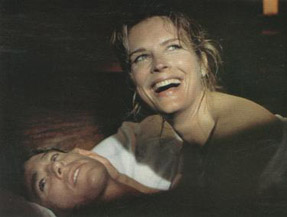|
|
Chapter Two:
|

|
“It takes someone very special to help you forget someone very special.”New at BOP: Share & Save
![]() Tweet
Tweet
![]() Print this column
Print this column
(So help me God this is the actual tagline of one of this week’s sequels.)
How do you follow-up a film about a once-in-a-lifetime romance? In the very first Chapter Two nearly three years ago, I opened with an answer to that question: Before Sunset. That film was Richard Linklater, Ethan Hawke, and Julie Delpy’s belated sequel to Before Sunrise, the story of an impossibly romantic night among a pair of attractive and articulate but relationship-weary 20-somethings on the streets of Vienna. Sunset looked at the both the fallout and the nostalgic glow of that night with the chance encounter of the two nearly a decade later in Paris. In human terms, it considered the tenuous possibility of a second chance for a match between two souls. But the parallel to sequels to romantic comedies/dramas is an apt one: what can you do for an encore to un/happily ever after? That would be like making a sequel to . . . Titanic. (In this case, I am thankful Cameron has simply opted for a 3D retrofit.)
|
Advertisement |
This week, I examine a pair of largely forgotten Chapter Twos from the mid-to-late 1970s, continuations of two of the most popular American cinematic romances from the beginning of that decade, critical/commercial/Academy favorites that struck a chord, I would argue, precisely because both dealt with loves that burned bright and quickly, and then were sundered by the forces of the universe. Class of ’44 and Oliver’s Story take very different tacks in following the further adventures of their (male) protagonists, and though both fall into the category of modest - as opposed to egregious or colossal - failures, one of them definitely has more on its mind than the other and explores more ambitious themes, even if that comes at the expense of its romantic attributes.
To begin with, it is revealing to consider how much their predecessors had in common. Love Story and Summer of ’42 were released only four months apart, in December 1970 and April 1971 respectively. Both were based on bestselling books (the former a fictional piece by Erich Segal, the latter a memoir by Herman Raucher) but in a “novel” twist, both stories had originally begun as screenplays that the studios - Paramount and Warner Bros - asked to be novelized and published prior to the film coming out. In each instance, the result was a self-perpetuating case of demand where the film version was able to quickly cash in on the story’s success, without having to buy the rights, hire a screenwriter, etc. (Segal and Raucher are solely credited for the screenplays.)
Both were significant box office successes on budgets common for the higher end big-studio projects of the time, in the neighborhood of $1 to $2 million. (Love Story was Paramount’s highest grosser up to that point, to be replaced by The Godfather a few years later.) Each was a multiple-Oscar nominee - seven for Love Story, four for Summer of ’42 - and each was a winner only for its score. Both films tell nostalgic stories of a romanticized love affair from the past, from the point of view of the man in the present, who is given brief voiceover narration to start and end the tale.

|
|
|

|
Friday, November 1, 2024
© 2024 Box Office Prophets, a division of One Of Us, Inc.

